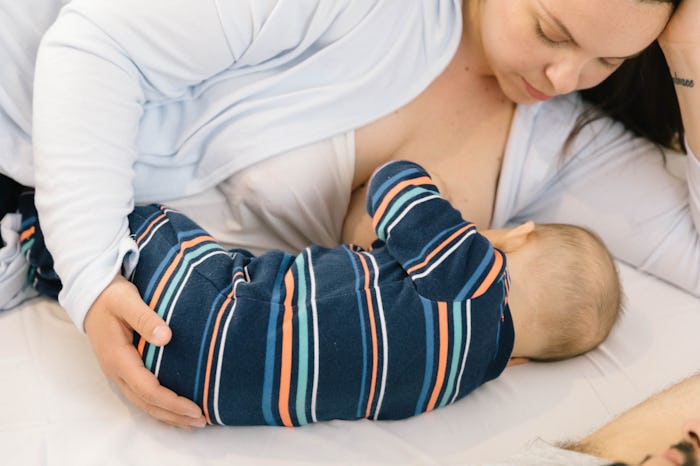Life
Here's Why Your Baby Seems To Sleep *So* Much Better Next To You
It doesn't matter how many times you've been warned off co-sleeping. At some point, exhaustion takes over and you're willing to do anything to get your baby to sleep so that you can, too. Think of how many pictures you've seen of a baby sleeping next to mom or dad. It's so peaceful because you can practically feel the relief emanating off the sleeping baby and parent. Why does it work that way? Have you ever wondered why your baby sleeps better next to you than in their spacious crib?
As it turns out, there is a scientific, evolutionary reason why babies prefer to sleep next to their parents. According to James J. McKenna Ph.D., and Edmund P. Joyce C.S.C., authors of Sleeping with Your Baby: A Parent’s Guide to Cosleeping, it's not only common, but "biologically appropriate." They argue that because of the ease of maternal-child bonding through breastfeeding that is made easier by bed-sharing and co-sleeping, both mother and child sleep more and better, and the mother becomes somehow more intrinsically aware of their babies through this process of night nursing and co-sleeping, irrespective of the warnings placed on this kind of sleeping by the American Academy of Pediatrics (AAP).
The AAP's guidelines remain unchanged regardless of any biological imperative that might exist. While scholars like Joyce and McKenna might view co-sleeping as a boon, the AAP is quick to remark on the very real dangers associated with the practice, namely the increased risk of SIDS. However, the organization does encourage room sharing for the first year of a baby's life in spite of their most recent research that found that babies begin to sleep better in their own room, and for longer periods of time, after 4 months of age.
Other medical experts like those at the website for Dr. Sears noted that research has found that "Sleep-sharing pairs showed more synchronous arousals than when sleeping separately. When one member of the pair stirred, coughed, or changed sleeping stages, the other member also changed, often without awakening." I can't decide if it's weird or adorable that I would mind meld with my infant to this point. I think it might be both.
Their research also argues that why your baby sleeps better next to you has a lot to do with the comforting touch of a parent. "A lot of mutual touch and interaction occurs between the sleep-sharers. What one does affects the nighttime behavior of the other," the website noted. Similar to the kangaroo hold so popular right now, there is documented benefit for loving touch. It bonds and calms the baby dramatically.
However, even though your baby might sleep like they've gone 10 rounds with the Sandman before getting completely milk drunk, there simply isn't a governing body around that supports the practice. The AAP, the Centers for Disease Control and Prevention, and even the fairly liberal National Health Service of the U.K. advise against it to a point.
Why is that? Because there are so many risk factors associated with it. How deep a sleeper are you or your partner? If they rolled over onto your baby or you did, would you notice? What if you've had a few drinks? What if your baby rolls off the bed? What if you get sick and faint? These are all possible risks for SIDS. Yes, it sounds terrifying, and in the end, you'll have to evaluate your choices and discuss it with your pediatrician.
But holding your baby for a nap? As long as you're conscious, you might at least get a few hours to read or watch Netflix while your tot sleeps safely in your embrace.
Check out Romper's new video series, Bearing The Motherload, where disagreeing parents from different sides of an issue sit down with a mediator and talk about how to support (and not judge) each other’s parenting perspectives. New episodes air Mondays on Facebook.
This article was originally published on
